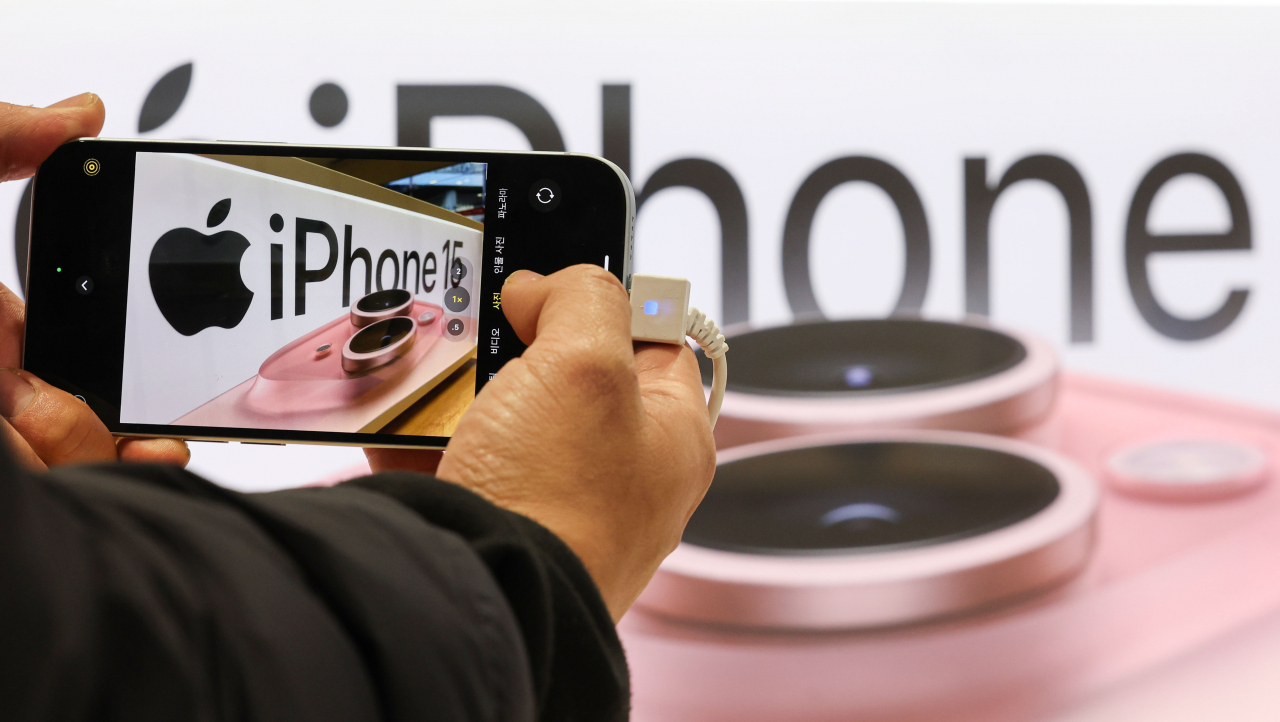[Exclusive] Korean military set to ban iPhones over 'security' concerns
Starting from military headquarters, a potential comprehensive ban could extend to all subordinate units: sources
By Hwang Joo-youngPublished : April 23, 2024 - 15:26

South Korea’s military is considering a comprehensive ban on iPhones in military buildings due to increasing concerns about possible leaks of sensitive information through voice recordings, according to multiple military sources on Tuesday.
The sources, a group of ranking officers who wished to speak on condition of anonymity, said that the Air Force headquarters released an internal announcement on the military's intranet server on April 11, instructing a complete prohibition on any device capable of voice recording and which do not permit third-party apps to control inherent functions, effective June 1, with "iPhones" cited as items subject to the ban.
According to the document, the decision to ban iPhones in the military came from joint meetings held by the headquarters of the Army, Navy and Air Force, located at Gyeryongdae in South Chungcheong Province.
The document was quoted as stating, "It’s inevitable to block any kind of voice recording, not just formal communications including meetings, office conversations, business announcements and complaints from and consultations with the public, but also informal communications such as private phone calls (within military buildings)."
The document also read, "There has been an ongoing review regarding the potential extension of this ban to all subordinate units," with the Army headquarters having conducted the ban on a trial basis since April. If the ban is extended, it will likely go beyond the Gyeryongdae area to encompass all other units across the nation.
The devices set to be prohibited encompass all types of smartwatches and wearable devices as well.
The sources, however, claimed that Android-based smartphones, mostly those from Samsung Electronics, will be exempted from the ban, while the document explicitly states that "Bringing in iPhones will be completely prohibited."
Currently, about 10,000 personnel, including some 6,000 officers, are estimated to be on duty at the Gyeryongdae defense center alone. For security reasons, the exact number is not disclosed to the public.
If the ban is extended to all subordinate units, it would affect almost 500,000 military personnel. According to the Korea Institute for Defense Analyses, a think tank under the Defense Ministry, the total number of military personnel is 499,8000 as of 2022, including 365,000 in the Army, 69,800 in the Navy and 65,000 in the Air Force.
Boon for Galaxy users?
The reason iPhones specifically would be banned, whereas Android-based smartphones, like Samsung’s Galaxy series, would not, is purportedly because iPhones do not fully comply with the restrictions outlined by the National Defense Mobile Security, a mobile device management application operated by the military authorities.
For instance, when activating the security app, it begins to restrict several smartphone functions, including the camera, Wi-Fi, tethering, USB functions and the microphone.
However, Apple does not allow third-party apps to control iPhones' inherent features, except for the camera.
The Ministry of National Defense introduced the security app in August 2013 to mitigate the risk of credential information leakage from its headquarters in Yongsan-gu, Seoul. Initially, this measure applied solely to those military officers and public officials working at the ministry.
The mandate to use the security app at high-security military facilities has been extended to include all military personnel since 2021. This decision coincided with the military authorities' initiative to permit soldiers to use smartphones during their mandatory military service, albeit only between 6 p.m. and 9 p.m.
The sources said that discussions regarding the potential ban on iPhones started in September last year when SK Telecom, the nation’s top telecom carrier, debuted an unprecedented call-recording feature for iPhones via app A-Dot. Apple’s iPhones do not support call-recording functions due to privacy issues as it is illegal in many of the US states, including California, to record voice calls without the consent of the other person.
In Korea, recording a call is legal but abuse cases such as infringement of privacy can be subject to legal punishment. Many Galaxy users say they continue to use Samsung phones largely due to the call-recording feature. Almost seven out of 10 people in Korea are Galaxy phone users.
Security vs. human rights
The document emphasized, "Considering the importance of Gyeryongdae -- where the headquarters of the Army, Navy and Air Force are -- it's crucial to maintain the same level of security as the Joint Chiefs of Staff."
Unlike the Defense Ministry, the Joint Chiefs of Staff, the highest military commanding entity over the country’s armed forces, previous to April 2020 did not permit any of its employees to use smartphones within its buildings, which are based in the same Yongsan neighborhood as the Defense Ministry.
Personnel working at the JCS were required to hand in their phones at the front desk before entering its buildings.
Even after the JCS began allowing the use of smartphones inside the buildings in April 2020, under the condition that their phones had the security app installed and activated, iPhone users still had continually to leave their phones at the front desk when entering its buildings.
This latest initiative to ban iPhones is also likely to exacerbate the disparity between Android and iPhone users in the future.
Recently, the Defense Ministry announced that it's considering gradually expanding the time window for soldiers to use smartphones from 6 p.m. to 9 p.m. to a maximum of 6 a.m. to 9 p.m. in a step-by-step phase.
With the implementation of the new guidelines, Android users would have the opportunity to use their phones for longer periods inside buildings. However, iPhone users in the same location would not enjoy the same privilege.
The security app has also faced criticism for its unreliability. Depending on which version an Android user may have, the app varies in which functions it restricts. However, another military official stated that this deficiency will likely be addressed later through a subsequent software update.
In the meantime, the National Human Rights Commission of Korea ruled in March that mandating that all military personnel at every location install the security app is excessively restrictive of human rights.
The commission recommended that the defense minister establish a provision for enforcing the installation of the security app within a relevant military security law. They also recommended limiting the mandatory installation of the app to essential personnel and locations only.



















![[Today’s K-pop] Treasure to publish magazine for debut anniversary](http://res.heraldm.com/phpwas/restmb_idxmake.php?idx=642&simg=/content/image/2024/07/26/20240726050551_0.jpg&u=)